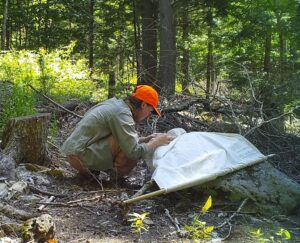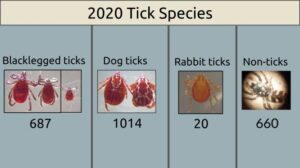Timber harvesting practices can change the forest microclimate, which may affect tick survival.

Previous Research
Christine Conte, a recent graduate student in the University of Maine’s Vector Ecology Lab, studied the differences between timber harvested (within five years) and unharvested land (no harvesting within 20 years) in Coastal Maine. She found ticks more frequently in unharvested land and also found that unharvested land had a significantly different microclimate compared to harvested land. Ticks are very sensitive to changes in temperature and humidity, therefore, these differences likely affect the ticks’ ability to survive. It seems like different forest management techniques may impact microclimate and tick populations.
With this in mind, we are working with landowners to see how their own management strategies affects tick populations and their associated pathogens.
2021 Citizen Science Results
2021 was a busy tick year! Our volunteers collected 2341 blacklegged ticks, 2872 dog ticks, and 70 rabbit ticks. We tested over 2100 blacklegged ticks for pathogens. See our summary report below for more details.

2020 Citizen Science Results
We have completed all tick identification and pathogen testing for 2020. We have identified over 2000 collected specimens to species and tested over 400 ticks for pathogens.
